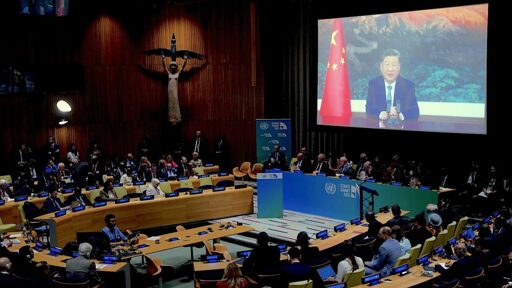COP30 in Belém may well be remembered as the moment that the world accepted the leading role of China in addressing humanity’s most important challenge.
but now the E.U. is beset by internal problems. Its primary industrial economy, Germany, is suffering from Chinese competition, and with the rise of right-wing parties, resistance has emerged to the ambitious climate policies of the European Commission. One symptom of these internal troubles was the E.U.’s embarrassing failure to agree its own mitigation targets before the informal deadline of September 30.
The United States, meanwhile, is trying to force its partner countries to buy more U.S. oil and gas.



We could all hope that China would lead the world in climate change as the country is the world’s biggest polluter (with coal consumption still on the rise as I wrote just in another thread).
However, China’s is far away of any leadership when it comes to reduce carbon emission.
The scientists from the Climate Actions Tracker call China’s recent announcement to cut its greenhouse gas emissions by 7% to 10% by 2035 as ‘disappointing’ as China - given the country’s size and economy - would need to cut emissions by around 30% for the world to be on track to the Paris goal.
According to the scientists, no country is on track to Paris, but while the EU and Brazil’s climate actions are insufficient, China and India’s are considered highly insufficient.
So it doesn’t look like leadership.
Would Europe and North America stop buying from China and Brazil because of emissions? I bet not. It’s not just China’s and Brazil’s responsability because a huge share of their emissions are to meet demand of the exports to Europe and North America.
I don’t think the other counteies are exactly forcing China and India to produce those items. They do and want to do it very low cost and that’s where the issues come from. China and India want to benefit from the demand and at that point you’ll have to admit to a responsibility in the situation.
@jol @Sepia it’s also crazy to call out the one nation that has flat lined their CO2 emissions for the last 18 months and whose renewable exports have actually dropped emissions in developing countries. We need overproduction of renewables.
@Jason Kraus
This is misleading and incomplete information that makes it outright false.
China is set to miss its target to cut carbon intensity – the CO2 emissions per unit of GDP – from 2020 to 2025. The country would need steeper reductions to hit the it’s 2030 goal.
Emissions from the production of cement and other building materials indeed fell by 7% in the third quarter of 2025, while emissions from the metals industry fell 1%. This is due, however, not to environmental policy in Beijing, but rather to the ongoing real-estate crisis, as the construction sector uses most of the country’s steel and cement output.
Power-sector emissions were also flat year-on-year in Q3/2025, with emissions from transport fell by 5%, but oil consumption in other sectors grew by 10%, driven by chemical industry expansion. This resulted in a 2% rise in oil consumption overall. Gas demand and emissions grew by 3% overall in Q3, with consumption in the power sector up by 9% and by 2% in other sectors.
Exactly. China does deserve a lot of credit for bringing the cost of solar down. What’s funny is that the US could have been the one if it wasn’t ruled by selfish idiots.
It seems unfair to compare the pollution per capita of an industrial economy that is exporting lots of industrial goods with that of the service economy that is importing most of those industrial goods. To compare a region that is exporting solar panels to be with a region that is importing them.
There are undoubtedly corrections you can make to fairly compare China and Europe, and I don’t know for sure if China is more green by those standards. But you’re definitely not saying something meaningful.
@Tiresia@slrpnk.net
I wrote that recently in another thread, and it’s true also here.
Your view is oversimplified to a degree that it is outright false.
However, it is not necessary to engage in such a discussion as it is not relevant here when we look at the data and how it is calculated.
According to the scientists at the Climate Action Tracker (CAT) cited in the linked report, China is behind by any metric, including by what the CAT scientists call a country’s “fair share.” This reflects the “common but differentiated responsibilities and respective capabilities, in the light of different national circumstances”, as stated in the Paris agreement (Article 4.3),
Here you can find China’s CAT rating. As you can see, China’s ‘policy and actions against fair share’ is rated as insufficient, with its overall rating highly insufficient.
As you can also see in the CAT rating, no country is on track, but China is among those countries most behind by any comparative standards.
Yes and no. First of all it’s not like the EU doesn’t have industry, secondly, China is choosing to profit from industrial export, nobody’s forcing them, it’s a deliberate action to pollute in exchange for economic benefit.